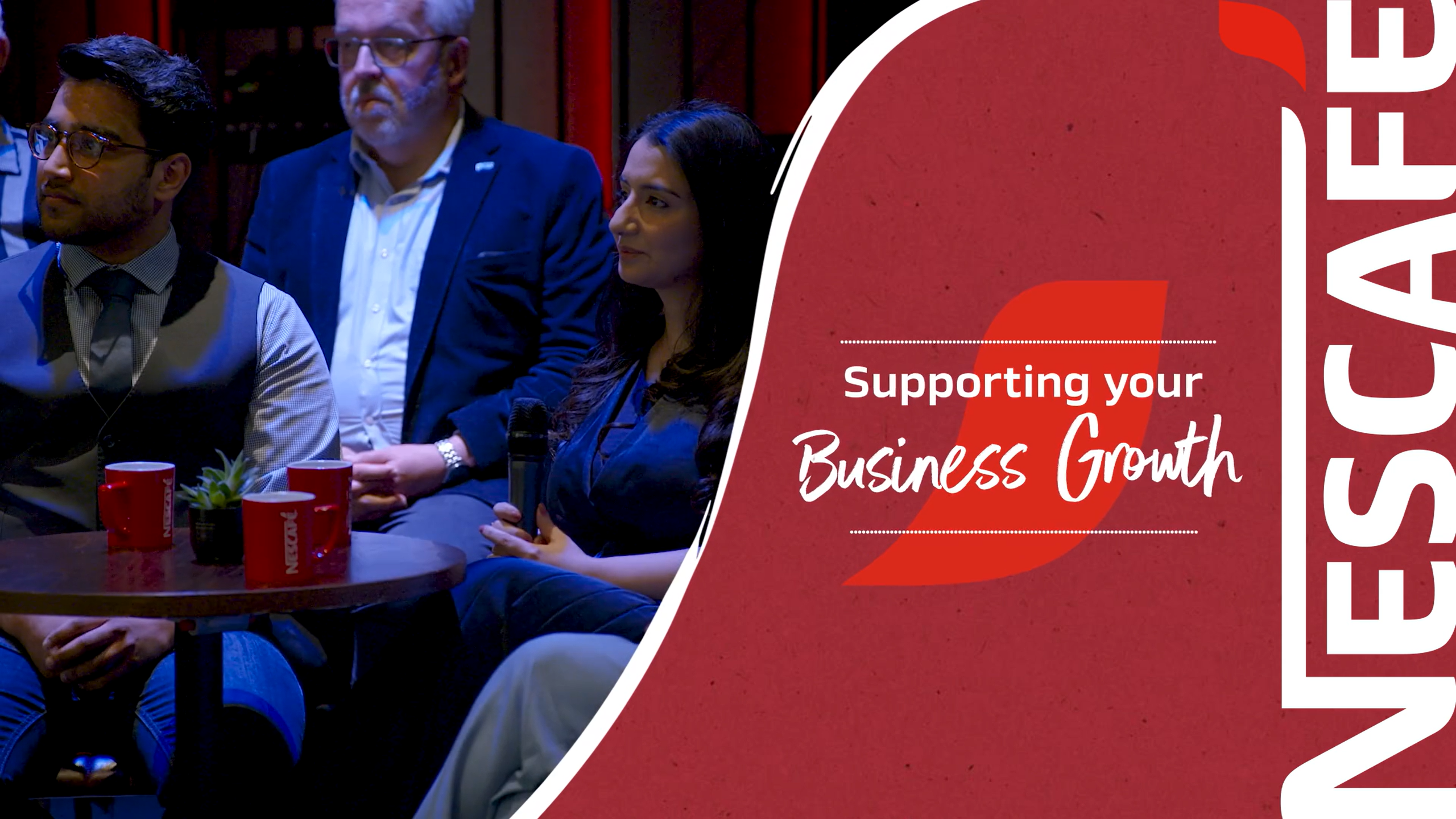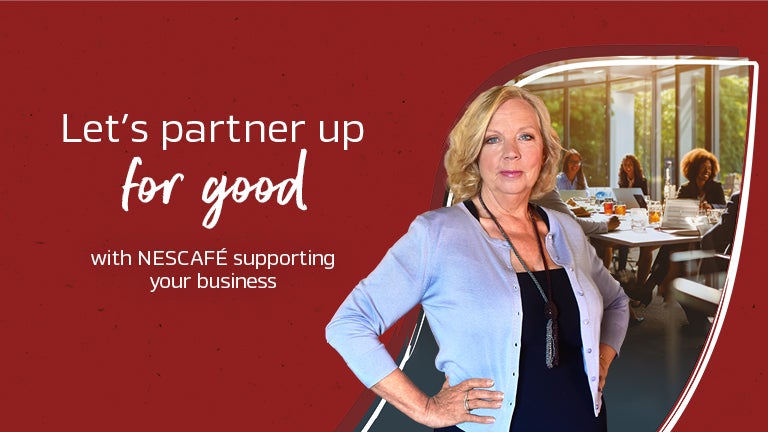
Strategies for Scaling Up Your Business: Exclusive Q&A
Watch the Business Advice Q&A session brought to you by Nestle Professional, with Deborah Meaden and industry experts.
In this exclusive Q&A session, we have the privilege of gaining valuable insights from two distinguished experts in the field: Deborah Meaden, a renowned Business Guru, and Katya Simmons, the Managing Director of Nestle Professional UK&I. They share their expertise on key topics essential for business growth, risk management, and organisational continuity.
This engaging discussion between experts covers essential aspects such as scaling up a business, approaching major retail stores, managing risk, and ensuring continuity within an organisation for long-term success.
Join us as we explore their insights and gain practical knowledge to navigate the challenges of the business world.
Question 1: Scaling up the business and approaching major retail stores
Scaling up a business and approaching major retail stores require careful consideration of product readiness and effective supply chain management. Before engaging with retailers, it is crucial to ensure that your product is ready for the market. This involves a thorough assessment of its quality, packaging, and compliance with necessary regulatory requirements.
Additionally, having a robust supply chain in place is essential to meet the demands of retailers and maintain a continuous supply. This includes establishing reliable sourcing, manufacturing, and distribution processes to ensure a seamless flow of products from production to retail shelves.
Considerations for production capacity and target retailers are also key factors to address. Understanding your production capacity is vital to determine if you can meet the potential demand from major retail stores. It involves assessing your current production capabilities, identifying any potential bottlenecks, and strategising ways to scale up production if needed.
Moreover, targeting the right retailers is crucial to ensure a successful entry into the market. Researching and identifying retailers that align with your product and target audience can significantly increase your chances of securing partnerships and gaining market visibility.
It's important to note that the UK retail market also presents opportunities for small businesses. While it may seem daunting to compete with larger corporations, many retailers have a keen interest in introducing unique and innovative products from small businesses. They often have dedicated programs or open days to discover and support emerging brands.
By leveraging these opportunities, small businesses can showcase their products, build relationships with retailers, and gain valuable exposure to a wider audience. With careful planning and a focus on product readiness and supply chain management, small businesses can successfully navigate the retail market and achieve growth.
In Summary:
- Product readiness and supply chain management are crucial for scaling up and approaching major retail stores.
- Thoroughly assess product quality, packaging, and regulatory requirements before engaging with retailers.
- Establish a robust supply chain with reliable sourcing, manufacturing, and distribution processes.
- Understand your production capacity and strategise ways to scale up if needed.
- Target the right retailers that align with your product and target audience for successful market entry.
- Retail market presents opportunities for small businesses to introduce unique and innovative products.
- Research and identify retailers with dedicated programs to support emerging brands.
- Leverage these opportunities to showcase products, build relationships, and gain exposure.
- Careful planning, product readiness, and supply chain management are key for small businesses to navigate the retail market and achieve growth
Question 2: Managing risk and continuing business growth
When it comes to managing risk and ensuring the continuity of a business, identifying a suitable successor within the organisation is of utmost importance. This involves recognising individuals who possess the necessary skills, knowledge, and leadership qualities to take on key roles and drive the business forward. By identifying a successor from within, the organisation can benefit from continuity in terms of culture, values, and vision. This ensures a seamless transition and minimises disruption during leadership changes.
Shared culture, values, and vision are vital elements in the succession process. It is crucial to have a successor who aligns with the existing organisational culture and values, as well as shares a similar vision for the future. This fosters a sense of stability and allows for the smooth continuation of the organisation's mission and goals. When the successor embodies the core values and understands the vision, they can effectively lead the team and maintain the organisation's identity.
However, it is important to acknowledge that the succession process can bring about potential challenges and tensions. The decision-making process surrounding succession may involve various stakeholders, including family members, board members, and employees. Conflicting opinions and interests can arise, leading to potential tensions within the organisation. It is crucial to navigate these challenges by fostering open communication, transparency, and inclusivity. By involving key stakeholders in the succession planning process and addressing concerns proactively, organisations can mitigate potential tensions and ensure a smoother transition of leadership.
In Summary:
- Identifying a suitable successor within the organisation is crucial for managing risk and ensuring business continuity.
- The successor should possess the necessary skills, knowledge, and leadership qualities to drive the business forward.
- Choosing a successor from within the organisation promotes continuity in terms of culture, values, and vision.
- Shared culture, values, and vision are essential elements in the succession process for a seamless transition.
- A successor who aligns with the organisation's culture and shares a similar vision ensures stability and the continuation of the mission and goals.
- The succession process may bring potential challenges and tensions due to conflicting opinions and interests.
- Open communication, transparency, and inclusivity are key in navigating these challenges.
- Involving key stakeholders in the succession planning process helps address concerns and mitigate tensions.
- Proactive management of the succession process ensures a smoother transition of leadership.
Question 3: Creating continuity in a large organisation
When it comes to ensuring continuity within a large organisation, UK business owners should understand the typical tenure expectations for leadership roles. It is generally recognised that individuals in leadership positions may serve for a period of five to seven years. This timeframe allows for fresh perspectives and the introduction of new ideas. By embracing a culture that encourages regular leadership transitions, organisations can benefit from the infusion of diverse perspectives and maintain a dynamic approach to decision-making.
To ensure a smooth transition and foster continuity, organisations must have effective strategies in place for growing talent within their ranks. This involves identifying high-potential individuals and providing them with opportunities for development and advancement. Implementing mentorship programs, leadership training initiatives, and cross-functional exposure can help nurture talent and prepare them for future leadership roles. By investing in the growth and development of employees, organisations can build a pipeline of capable leaders who can seamlessly step into key positions when the time comes.
Organisational culture plays a vital role in maintaining continuity during leadership transitions. A strong and well-defined culture provides a foundation for shared values, norms, and behaviours within the organisation. By fostering a culture that embraces adaptability, collaboration, and learning, organisations can ensure a smooth transition of leadership and maintain a sense of stability. When the organisational culture is deeply ingrained and understood by employees, it becomes an essential guiding force that enables continuity even in the face of leadership changes.
In summary, understanding typical tenure expectations, implementing talent growth strategies, and nurturing a strong organisational culture are key elements in maintaining continuity within a big organisation. By embracing these practices, organisations can navigate leadership transitions effectively and ensure a seamless flow of operations and decision-making.
In summary:
- Understanding typical tenure expectations for leadership roles allows for fresh perspectives and new ideas.
- Regular leadership transitions promote diverse perspectives and dynamic decision-making.
- Effective talent growth strategies involve identifying high-potential individuals and providing development opportunities.
- Mentorship programs, leadership training, and cross-functional exposure nurture talent for future leadership roles.
- Investing in employee growth and development builds a pipeline of capable leaders for seamless transitions.
- Organisational culture plays a vital role in maintaining continuity during leadership changes.
- A strong culture with shared values and norms ensures stability and guides decision-making.
- Embracing adaptability, collaboration, and learning fosters a smooth transition of leadership.
- Nurturing a strong organisational culture enables continuity even in the face of leadership changes.
- These practices help organisations navigate transitions and ensure a seamless flow of operations and decision-making.
In this enlightening Q&A session, experts Deborah Meaden and Katya Simmons have shared valuable advice and insights on various aspects of business growth and continuity. The key takeaways emphasise the significance of product readiness and supply chain management when scaling up a business and approaching major retail stores in the UK. Additionally, the experts highlight the importance of succession planning, identifying successors within the organisation, and fostering a shared culture and vision for future continuity. Furthermore, the discussion emphasises the critical role of talent development strategies in ensuring a smooth transition and maintaining organisational continuity. By focusing on these key areas, businesses can enhance their chances of growth and navigate the challenges of the ever-evolving business landscape.
Key Insights:
- Product readiness and supply chain management are crucial for scaling up and approaching major retail stores.
- Consider production capacity and target retailers when expanding into the UK retail market.
- Succession planning and identifying suitable successors within the organisation are essential for continuity.
- Shared culture, values, and vision play a vital role in maintaining continuity during leadership transitions.
- Talent development strategies are key to nurturing future leaders and ensuring a smooth transition.
- Organisational culture is instrumental in maintaining continuity and stability.
By prioritising product readiness, supply chain management, succession planning, and talent development, businesses can lay a solid foundation for growth and secure long-term success.





